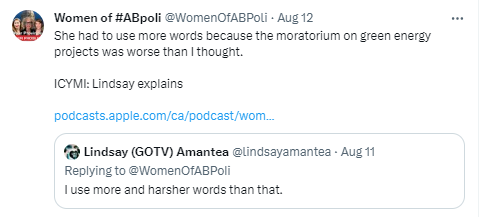Whatever takes the focus off your head
This week in AB
More, more, moratorium
As a political primer on what some are saying is “like taking a jackhammer to a nail”, I’m going to bring in a blast from the past: a thorn in the side of the PC Party, former Wildrose MLA Joe Anglin.
Anglin quit the Wildrose in November of 2014 citing “internal ‘civil war’” which ended with spectacular fireworks when then-Wildrose leader and now-Premier Danielle Smith was sprinting to catch the opportunist’s gravy train being driven straight into a brick wall by Alberta’s final PC Premier, Jim Prentice.
(By the bye, the most amusing part of that article is that Smith was awarded full confidence from caucus and her own motion to force a leadership review at the party’s upcoming AGM was defeated. L-O-F-L)
Anglin’s part in this story, though, begins in 2011 when he was simply referred to as “a dangerous individual and a trouble maker”.
At the time, someone who wasn’t in line to pad their election hopes with oil money probably would have said Anglin was making “good trouble”.
The PC’s had agreed to spend $16 billion on a massive transmission line project that would carry excess electricity produced by oil sands developers into the U.S. for private profit.
Seriously — how much Alberta Advantage is too much?
Anglin became active when he discovered that property owners along the proposed lines were essentially receiving “sucks to be you” notices that these projects were going forward and their consent was not required.
As most ridiculously engaged Albertans know, the Wildrose Party of old (and once again brought back from the dead) had/has property rights as one of their central tenets.
While Smith works to rebuild the impression that she totes has these folk’s backs (this time for realsies), the moratorium seems like the best way to prove that.
As for the billions of investment dollars, jobs, etc., being put on the line, I suppose it’s as good a time as any to remind Albertans that, unless you can help her career, Danielle Smith didn’t come back for you.
Now, for the rest of the story.
The moratorium really was worse than I thought. As Lindsay Amantea noted in our recent free-to-all episode, the pause wasn’t just on “new” projects, it was was new approvals — at stage three of a five stage approval process.
Lindsay is a lawyer who works with green energy companies on these approval processes (which she adds take years and hundreds of thousands of dollars). So, anyone who has been working through this process, but has yet to receive the approval at stage three, got their own “sucks to be you” notice from the Alberta government.
Alberta: where getting re-elected is way more important than our children’s future.
Canada
Pierre Poilievre and the uneasy coupling of freedom and force
We’ve seen a disturbing trend of Republican idolatry in our federal politics. In Alberta we’ve always had one day-dreamy eye on the grass of our neighbours to the south which allowed our government to pilfer our future to benefit American businesses… but I digress (yes, again).
The term “natcon” and “freecon” showed up in the American political discourse in July and has been brought across the border while concerned conservative (or conservative leaning) columnists view the current oddity that is the Conservative Party of Canada under its lens.
On the one hand, there are traditional “freedom” conservatives, who believe in, well, conservatism: free markets, individual rights, personal responsibility, a strong defence. On the other, there are the newer “national” conservatives, as they style themselves, who believe in none of these things.
Andrew Coyne, Globe and Mail, 8/11/2023
Importantly, Sean Speer of The Hub, provides additional context to this separation.
While the FreeCons reflect a conventional conservative skepticism of state action (“political freedom cannot long exist without economic freedom”), the NatCons don’t share the same reservations. Not only is their economic agenda more state-centric (“the free market cannot be absolute”) but they’re also openly prepared to use the levers of state power to promote a “shared Western civilization” and pushback against “universalist ideologies…, immorality…[and] destructive personal habits.”
This vision of conservative statecraft reflects a common argument from NatCon voices: in a world in which the only major culture-shaping institution that conservatives may conceivably control is the government, they need to be prepared to use state power for conservative ends.
Sean Speer, The Hub, 07/29/2023
This is, essentially, the perfect description of the former Progressive Conservatives and Reform Party of Canada.
The former leader of Reform, Preston Manning, led a rebellion in the form of a political party. Despite the general “common sense” platform Reform carried, the party was a beacon to those who saw government not as a force for good but rather a force in general.
These people felt personally attacked by removing discrimination against things they felt was their obligation to discriminate against.
Though Manning has since handed his marbles to the conspiracy theorists, his initial goal was, charitably, a noble one — even if it was predicated on the unholy alliance that is religion and governance.
While Reform had the pillars of freedom conservatism, it had a foundation of national conservatism.
Poilievre is a child of Reform. He became politically engaged in his teens and has aligned himself well, proving his ability to move comfortably within certain circles.
With enough subtlety, I believe he can connect the freecons and natcons because while they value their own freedom, they don’t much like others to “abuse” the privileges they take for granted.
Whether this continues to appeal to the public in two years, I cannot say, but for now, Poilievre is walking easily between both worlds and with a few popular policies, people will be much less inclined to wonder which side he’s really on.








